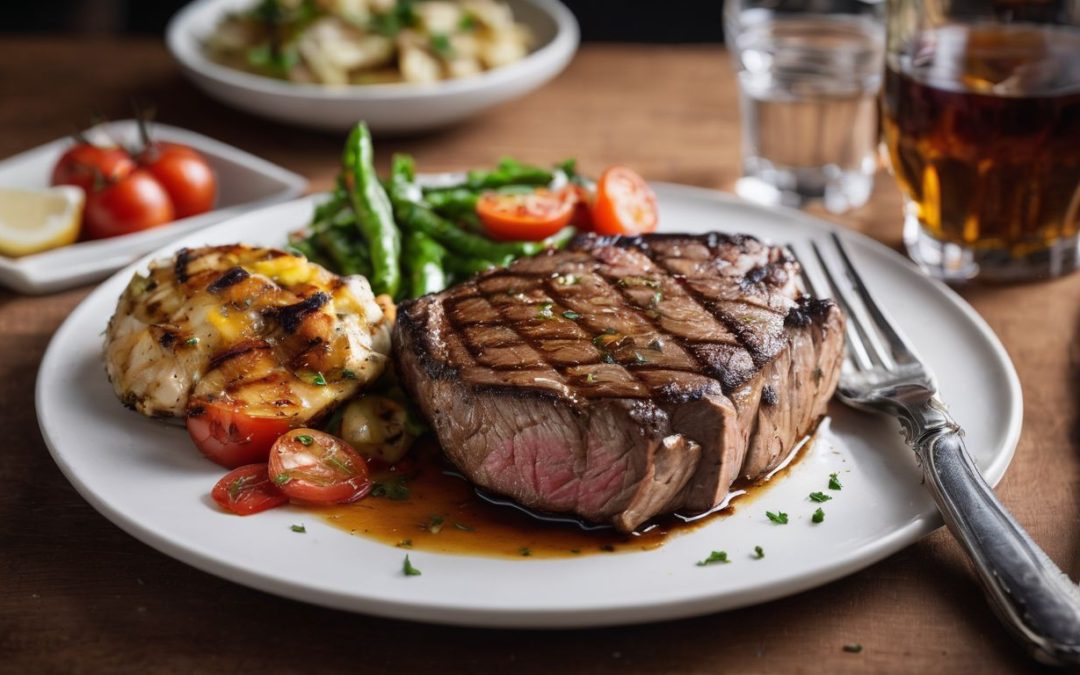Are you a meat lover struggling to decide between beef and chicken for your protein fix? Here’s a fun fact: while beef packs more calories, chicken often comes out on top in the protein department.
This blog will delve into the macronutrient maze of these two popular meats, comparing everything from their protein content to their vitamin and mineral profiles. Intrigued? Let’s dive deep into this savory showdown!
Nutritional Comparison of Beef and Chicken

Beef and chicken differ in their nutritional profiles, including protein content, fat content, cholesterol levels, and vitamin and mineral content.
Protein content
Chicken takes the win for protein. Each 100-gram part of chicken holds more protein than beef. Athletes and bodybuilders love it because it helps their muscles grow strong! But don’t forget about beef – it also packs a good protein punch.
Even though beef has less protein, there’s still a lot in each bite. Both meats can help your body stay healthy and strong with loads of protein.
Fat content
Beef has more fat than chicken. Every 100 grams of steak gives you about 21 grams of fat. On the other hand, the same part of chicken only has 9 grams.
Grass-fed beef will give you omega-3s that help fight swelling in your body. But if we look at saturated fats, they are more in beef than chicken. Out of all the fat in steak, around 8 grams is saturated fat.
In chicken, it’s just three grams! Not all fats are bad though; some can be good for our health too! So enjoy your meat but also think about its fat content.
Cholesterol levels
Chicken meat and ground beef have similar levels of cholesterol. High cholesterol in the body can increase heart disease risk. That said, eating lean cuts of both chicken and beef is better for your health.
This is because they are lower in fat content. Both meats offer good protein too! However, all kinds of meat should be eaten in sensible amounts. Too much red meat like steak might hurt your heart over time.
Enjoy your slab of beef or serving of chicken breast but keep track so you don’t eat too much! Lean beef and chicken provide high-quality protein that helps build muscles without adding bad fats to your body.
Vitamin and mineral content
Beef and chicken both contain important vitamins and minerals that our bodies need to stay healthy. Beef is a good source of iron, zinc, and vitamin B12. Iron helps carry oxygen throughout our bodies and supports our immune system.Zinc is important for growth, wound healing, and a healthy immune system. Vitamin B12 is necessary for red blood cell production and brain function. On the other hand, chicken provides us with niacin, which helps convert food into energy. as well as vitamin B6 which supports brain development and function.
So whether you prefer beef or chicken, both meats provide essential nutrients that contribute to our overall health.
Health Impact of Beef and Chicken Consumption

Consuming beef and chicken can have various health impacts, including effects on cardiovascular health, diabetes risk, cancer risk, and allergies. To discover the potential benefits and drawbacks of each meat type, keep reading!
Cardiovascular health
When it comes to cardiovascular health, choosing the right meat can have a big impact. Both beef and chicken can be part of a healthy diet, but there are some differences to consider.
Beef is higher in saturated fat compared to chicken, which can increase the risk of heart disease. On the other hand, chicken is leaner and contains less saturated fat than beef. It’s also a great source of protein, which is important for maintaining a healthy heart.
So if you’re looking to support your cardiovascular health, opting for lean cuts of chicken over fatty beef can be a smart choice.
Diabetes risk
Eating beef and chicken can have different effects on your risk of developing diabetes. While both meats can be part of a healthy diet, it’s important to be aware of their impact. Beef contains more calories and fats compared to chicken meat, which can increase the risk of obesity and insulin resistance – key factors in type 2 diabetes.
On the other hand, chicken is lower in fat and higher in protein compared to beef, making it a better choice for managing blood sugar levels. So if you’re concerned about diabetes risk, opting for lean cuts of chicken over beef may be a wise choice.
Cancer risk
Consuming red meat, including beef and processed meats, has been associated with an increased risk of certain types of cancer. Research suggests that regularly eating large amounts of red and processed meats may raise the risk of colorectal cancer.
The compounds formed during cooking at high temperatures, such as heterocyclic amines (HCAs) and polycyclic aromatic hydrocarbons (PAHs), can also contribute to cancer development.
To reduce your cancer risk, it’s advisable to limit your consumption of red and processed meats, opting for leaner cuts and incorporating more poultry like chicken into your diet instead.
Allergies
Allergies can be a concern when it comes to consuming beef and chicken. While allergies to beef are rare, some people may experience an allergic reaction to certain proteins found in beef.
On the other hand, chicken meat is generally considered less allergenic compared to other types of meat. However, individuals with a poultry allergy may still have an allergic response to chicken.
It’s important for individuals with known allergies or sensitivities to these meats to avoid consumption and seek medical advice if necessary.
Benefits of Beef Consumption
Beef consumption offers benefits such as high iron and zinc content, as well as the advantages of vitamin B12.
Iron and zinc content
Beef is a good source of iron and zinc, which are important minerals for our bodies. Iron helps transport oxygen in our blood and supports overall health. Zinc plays a role in immune function and helps with cell growth and repair.
Beef contains more iron than chicken, making it a great choice if you need to boost your iron levels. It also has higher zinc content compared to chicken meat. So, if you’re looking to increase your intake of these essential minerals, beef is a good option!
Vitamin B12 benefits
Vitamin B12 is an essential nutrient found in both beef and chicken that offers important benefits for our bodies. It helps support the formation of red blood cells, which carry oxygen throughout our system.
This means it can help prevent anemia and improve energy levels. Vitamin B12 also plays a crucial role in maintaining healthy nerve function and brain health, helping to reduce the risk of neurological problems as we age.
So whether you choose beef or chicken, you can enjoy the benefits of vitamin B12 for your overall well-being.
Benefits of Chicken Consumption
Chicken consumption offers several benefits due to its nutritional profile. It is lower in fat content compared to beef, making it a healthier protein option, while still providing high levels of protein.
Additionally, chicken is rich in niacin and vitamin B6, which are essential for energy production and immune system function.
Lower fat content
Chicken is known for its lower fat content compared to beef. This makes it a popular choice for those looking to reduce their fat intake. Skinless chicken breast, in particular, is considered one of the leanest cuts of meat available.
It contains less saturated fat than beef and is a great source of lean protein. In fact, chicken breast has about 31 grams of protein per serving, making it an excellent option for muscle-building and weight management.
So if you’re watching your fat intake but still want to enjoy a delicious and nutritious meal, choosing chicken over beef can be a healthier choice.
Higher protein content
Chicken meat is known for its higher protein content compared to beef. Protein is essential for building and repairing muscles, supporting immune function, and promoting overall health.
Chicken provides a good amount of high-quality protein, making it a popular choice among athletes and bodybuilders. In fact, chicken breast contains about 31 grams of protein per serving, which is higher than beef.
So if you’re looking for a lean and protein-packed option, chicken is the way to go!
Niacin and vitamin B6 benefits
Both beef and chicken provide important nutrients like niacin and vitamin B6. Niacin helps support your metabolism, while vitamin B6 is essential for brain development and function.
Beef contains higher amounts of niacin compared to chicken, with 5.8 milligrams per 100 grams compared to chicken’s 4.9 milligrams. On the other hand, chicken is richer in vitamin B6, offering 0.45 milligrams per 100 grams versus beef’s lower content of 0.34 milligrams.
Including both beef and chicken in your diet can help ensure you get a good balance of these essential vitamins for optimal health.
Differences in Preparation and Cooking
Beef and chicken require different cooking methods to bring out their unique flavors and textures. From grilling a juicy steak to roasting a tender chicken, explore the diverse possibilities in preparing these protein-packed meats.
Find out more about the best ways to cook beef and chicken for your next delicious meal!
Cooking methods for beef
Beef can be cooked in various ways to bring out its deliciousness. Here are some popular cooking methods for beef:
- Grilling: Grilling is a great way to cook beef, especially for steaks and burgers. It gives the meat a smoky flavor and a nice charred exterior.
- Roasting: Roasting is perfect for larger cuts of beef like roast beef or prime rib. It ensures that the meat cooks evenly and retains its juiciness.
- Braising: Braising involves slow-cooking beef in liquid, like broth or wine, until it becomes tender and flavorful. This method is ideal for tougher cuts of beef.
- Stir-frying: Stir-frying is a quick and easy way to cook thinly sliced beef. It allows the meat to retain its tenderness while getting infused with spices and sauces.
- Slow cooking: Slow cooking involves simmering beef in a crockpot or slow cooker for several hours. This method results in tender, melt-in-your-mouth meat.
Cooking methods for chicken
Here are some cooking methods for chicken that meat lovers will enjoy:
- Grilling: Fire up the grill and cook juicy chicken breasts or drumsticks with a smoky flavor. It’s perfect for summer barbecues.
- Roasting: Preheat your oven and roast a whole chicken, seasoned with herbs and spices, until it’s golden brown and tender on the inside.
- Baking: Make crispy chicken tenders or delicious stuffed chicken breasts by baking them in the oven. It’s an easy way to cook chicken without much effort.
- Stir-frying: Heat up a wok or skillet and quickly cook sliced chicken with vegetables for a healthy and flavorful stir-fry dish.
- Pan-searing: Get a nice crust on your chicken by searing it in a hot skillet with oil. Finish cooking it in the oven for evenly cooked and juicy meat.
- Deep-frying: When you’re in the mood for something crispy, deep-fry breaded chicken pieces until they turn golden brown and crunchy on the outside.
Choosing the Right Protein Source for Your Diet
Consider your personal health goals and dietary restrictions when deciding between beef and chicken as your protein source. Learn about the nutritional profiles and health impacts of both meats to make an informed decision that suits your needs.
Considerations for personal health goals and dietary restrictions
When it comes to choosing between beef and chicken, there are some important factors to consider based on your personal health goals and dietary restrictions. If you’re looking to reduce your intake of saturated fat and cholesterol, chicken may be a better option as it tends to have less fat content compared to beef.
On the other hand, if you’re aiming for higher protein intake or need more iron and zinc in your diet, lean cuts of beef can offer these benefits. It’s also worth noting that grass-raised beef contains omega-3s which can help fight inflammation.
Ultimately, the choice between beef and chicken depends on what aligns best with your specific needs and preferences.
Conclusion
In conclusion, when it comes to protein, both beef and chicken have their advantages. Beef is a great source of iron and zinc, while chicken is lower in fat and higher in protein. Choosing between the two depends on your personal health goals and dietary restrictions.
So whether you prefer a juicy steak or a grilled chicken breast, both options can be part of a healthy diet.
FAQs
1. What is the difference in protein between beef and chicken?
There’s a slight protein difference, with beef being richer in protein whereas chicken has a higher level of vitamins like vitamin B12 and folate.
2. Is red meat or white meat better for me?
Both types of meat are great sources of complete proteins and essential amino acids. It comes down to your personal health goals as some cuts may have higher fat content than others.
3. Are all cuts of beef and chicken high in protein?
Yes, but the amount might vary a bit. For instance, strip steak from beef is rich in protein just like cooked chicken.
4.Which type of meat should I eat if I am trying to cut calories?
Chicken is often the go-to protein source because it typically has fewer calories than certain cuts of beef such as sirloin steak.
5. Does eating one type over another affect my heart health?
It can! The American Heart Association advises folks limit processed red meats due to trans fats; instead try lean meats like fish, shellfish or roasted chicken for heart health benefits.
6.What else should I keep in mind while choosing between ribeye steaks from cows vs broiler chickens?
Think about your tastes – each kind of meat offers different flavors plus they’re both high-level sources for our daily needed nutrients such as iron, zinc besides building blocks called Amino Acids.
Greetings!
With over two decades of diverse experience in the meat industry, I proudly stand as an expert in all things meat. My journey commenced with a strong foundation in hospitality, where I honed my culinary skills as a chef in prestigious restaurants and on luxurious superyachts worldwide.
However, my true passion lies in the art of butchery. Throughout my extensive career, I have had the privilege of working with renowned meat purveyors and mastering the craft of meat cutting and preparation. From breaking down whole carcasses to meticulously selecting prime cuts, my butchery expertise is at the core of my meat knowledge.
Having immersed myself in various cultures and cuisines, I have honed my skills to deliver exceptional dining experiences, crafting delectable dishes that celebrate the natural flavors of different meats. Whether it’s sourcing the finest meats for discerning clients or sharing valuable tips on meat selection and cooking, I take pride in elevating the meat experience for both professionals and enthusiasts.
My journey has taken me from the bustling kitchens of top-rated restaurants to the heart of meat processing facilities, gaining insights and honing my skills to become a true meat connoisseur. Now, I am enthusiastic about sharing my expertise, offering valuable insights on meat selection, cooking techniques, and the art of butchery.
















